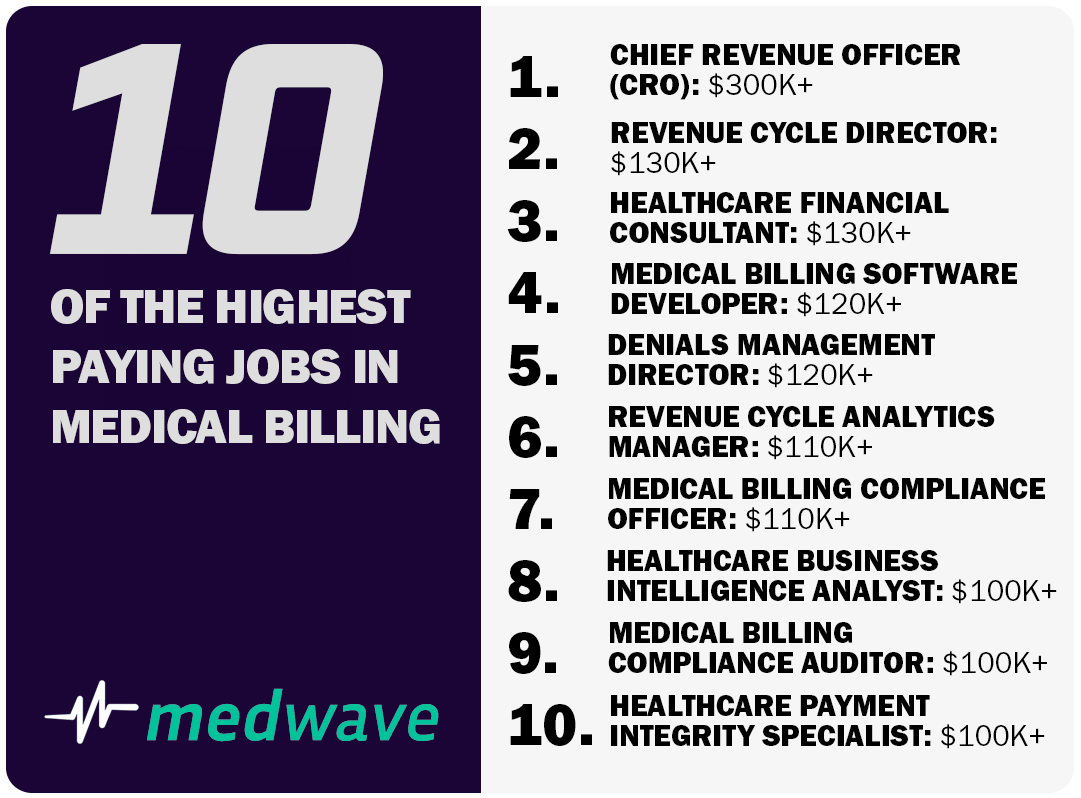Medical billing is a crucial component of the healthcare industry, ensuring that healthcare providers receive proper reimbursement for their services. As the field continues to evolve with advancements in technology and changes in healthcare policies, medical billing professionals are in high demand.
We check out 25 of the highest-paying medical biller jobs, providing insights into their roles, responsibilities, and potential earnings.
Medical Billing Manager
Average Annual Salary: $70,000 – $100,000
Medical Billing Managers oversee the entire billing department, ensuring smooth operations and compliance with regulations. They manage staff, implement policies, and work closely with other departments to optimize revenue cycles.
Key Responsibilities:
- Supervise billing staff
- Develop and implement billing procedures
- Ensure compliance with healthcare regulations
- Analyze financial data and prepare reports
Revenue Cycle Director
Average Annual Salary: $90,000 – $130,000
Revenue Cycle Directors are responsible for overseeing the entire revenue cycle, from patient registration to final payment collection. They work to improve efficiency, reduce errors, and maximize revenue for healthcare organizations.
Key Responsibilities:
- Develop and implement revenue cycle strategies
- Analyze financial performance metrics
- Collaborate with various departments to streamline processes
- Ensure compliance with billing regulations and insurance requirements
Healthcare Data Analyst
Average Annual Salary: $65,000 – $95,000
Healthcare Data Analysts use their expertise in data analysis to improve billing processes, identify trends, and support decision-making in healthcare organizations.
Key Responsibilities:
- Analyze billing data to identify patterns and trends
- Develop reports and dashboards for management
- Recommend process improvements based on data insights
- Support fraud detection and prevention efforts
Medical Coding Specialist
Average Annual Salary: $45,000 – $70,000
Medical Coding Specialists assign appropriate codes to medical procedures and diagnoses, ensuring accurate billing and proper reimbursement.
Key Responsibilities:
- Review medical records and assign appropriate codes
- Stay updated on coding guidelines and regulations
- Collaborate with healthcare providers to clarify documentation
- Ensure accuracy and compliance in coding practices
Charge Capture Specialist
Average Annual Salary: $50,000 – $75,000
Charge Capture Specialists focus on ensuring that all billable services provided to patients are accurately captured and billed.
Key Responsibilities:
- Review medical records to identify billable services
- Ensure proper documentation for all charges
- Collaborate with clinical staff to improve charge capture processes
- Analyze charge capture data to identify improvement opportunities
Billing Compliance Officer
Average Annual Salary: $75,000 – $110,000
Billing Compliance Officers ensure that healthcare organizations adhere to all relevant laws, regulations, and ethical standards in their billing practices.
Key Responsibilities:
- Develop and implement compliance programs
- Conduct internal audits to identify compliance issues
- Provide training on billing compliance to staff
- Investigate and resolve compliance-related concerns
Medical Billing Software Developer
Average Annual Salary: $80,000 – $120,000
Medical Billing Software Developers create and maintain software solutions specifically designed for medical billing and revenue cycle management.
Key Responsibilities:
- Design and develop medical billing software
- Implement updates and new features based on industry changes
- Provide technical support for software users
- Collaborate with healthcare professionals to understand user needs
Claims Denial Management Specialist
Average Annual Salary: $55,000 – $80,000
Claims Denial Management Specialists focus on reducing claim denials and managing the appeals process for denied claims.
Key Responsibilities:
- Analyze denied claims to identify patterns and root causes
- Develop strategies to reduce claim denials
- Manage the appeals process for denied claims
- Train staff on best practices for claim submission
Healthcare Financial Consultant
Average Annual Salary: $80,000 – $130,000
Healthcare Financial Consultants provide expert advice to healthcare organizations on improving their financial performance, including billing and revenue cycle management.
Key Responsibilities:
- Assess current financial processes and identify areas for improvement
- Develop strategies to enhance revenue cycle efficiency
- Provide guidance on implementing new billing technologies
- Offer training and support to staff on financial best practices
Credentialing Specialist
Average Annual Salary: $45,000 – $70,000
Credentialing Specialists ensure that healthcare providers have the necessary credentials to bill insurance companies for their services.
Key Responsibilities:
- Verify and maintain provider credentials
- Submit credentialing applications to insurance companies
- Track and renew provider credentials as needed
- Ensure compliance with credentialing regulations
Medical Billing Trainer
Average Annual Salary: $60,000 – $90,000
Medical Billing Trainers educate staff on billing procedures, software usage, and industry regulations to ensure efficient and compliant billing practices.
Key Responsibilities:
- Develop and deliver training programs on medical billing
- Create training materials and resources
- Assess staff competency and provide ongoing support
- Stay updated on industry changes and incorporate them into training
Billing Quality Assurance Specialist
Average Annual Salary: $50,000 – $75,000
Billing Quality Assurance Specialists focus on maintaining high standards of accuracy and compliance in the billing process.
Key Responsibilities:
- Conduct audits of billing processes and documentation
- Identify areas for improvement in billing accuracy
- Develop and implement quality control measures
- Provide feedback and training to billing staff
Medical Billing Auditor
Average Annual Salary: $60,000 – $90,000
Medical Billing Auditors review billing practices to ensure accuracy, compliance, and optimal reimbursement for healthcare services.
Key Responsibilities:
- Conduct internal and external billing audits
- Identify billing errors and compliance issues
- Recommend corrective actions and process improvements
- Prepare audit reports for management and regulatory bodies
Healthcare EDI Specialist
Average Annual Salary: $55,000 – $85,000
Healthcare Electronic Data Interchange (EDI) Specialists manage the electronic transmission of healthcare data, including claims and remittances.
Key Responsibilities:
- Implement and maintain EDI systems
- Troubleshoot EDI-related issues
- Ensure compliance with EDI standards and regulations
- Collaborate with payers and clearinghouses to resolve transmission issues
Revenue Integrity Specialist
Average Annual Salary: $65,000 – $95,000
Revenue Integrity Specialists focus on ensuring that healthcare organizations capture all appropriate charges and receive proper reimbursement for services provided.
Key Responsibilities:
- Analyze charge capture processes for completeness and accuracy
- Identify and resolve charging discrepancies
- Develop and implement charge capture improvement strategies
- Collaborate with clinical and financial departments to optimize revenue
Medical Billing Supervisor
Average Annual Salary: $60,000 – $85,000
Medical Billing Supervisors oversee day-to-day billing operations and manage a team of billing specialists.
Key Responsibilities:
- Supervise and mentor billing staff
- Monitor billing performance metrics
- Resolve complex billing issues
- Implement process improvements in the billing department
Reimbursement Specialist
Average Annual Salary: $50,000 – $75,000
Reimbursement Specialists focus on maximizing reimbursement for healthcare services by ensuring proper coding, documentation, and claim submission.
Key Responsibilities:
- Analyze reimbursement trends and patterns
- Develop strategies to optimize reimbursement
- Work with payers to resolve reimbursement issues
- Provide guidance on contract negotiations with payers
Healthcare Business Intelligence Analyst
Average Annual Salary: $70,000 – $100,000
Healthcare Business Intelligence Analysts use data analytics to provide insights that improve billing processes and financial performance.
Key Responsibilities:
- Develop and maintain business intelligence dashboards
- Analyze billing and financial data to identify trends and opportunities
- Create reports to support decision-making
- Collaborate with management to implement data-driven strategies
Medical Billing Educator
Average Annual Salary: $65,000 – $95,000
Medical Billing Educators develop and deliver educational programs on medical billing for healthcare professionals, students, and staff.
Key Responsibilities:
- Design curriculum for medical billing courses
- Teach medical billing concepts and practices
- Develop educational materials and resources
- Stay updated on industry changes and incorporate them into coursework
Denials Management Director
Average Annual Salary: $85,000 – $120,000
Denials Management Directors lead efforts to reduce claim denials and improve the overall revenue cycle process.
Key Responsibilities:
- Develop and implement denial prevention strategies
- Oversee the appeals process for denied claims
- Analyze denial trends and root causes
- Collaborate with various departments to improve documentation and coding
Healthcare Payment Integrity Specialist
Average Annual Salary: $70,000 – $100,000
Healthcare Payment Integrity Specialists focus on preventing, detecting, and resolving improper payments in healthcare billing.
Key Responsibilities:
- Conduct audits to identify improper payments
- Develop and implement fraud prevention strategies
- Collaborate with payers on payment integrity initiatives
- Train staff on proper billing practices to prevent errors
Medical Billing Systems Analyst
Average Annual Salary: $65,000 – $95,000
Medical Billing Systems Analysts evaluate, implement, and optimize billing software and systems to improve efficiency and accuracy.
Key Responsibilities:
- Assess current billing systems and identify improvement opportunities
- Implement new billing technologies and software
- Provide technical support and troubleshooting
- Train staff on system usage and best practices
Revenue Cycle Analytics Manager
Average Annual Salary: $80,000 – $110,000
Revenue Cycle Analytics Managers use data analytics to optimize the entire revenue cycle, from patient registration to final payment collection.
Key Responsibilities:
- Develop and maintain analytics dashboards for revenue cycle management
- Identify trends and opportunities for improvement in the revenue cycle
- Provide data-driven insights to support decision-making
- Collaborate with various departments to implement analytics-based strategies
Medical Billing Compliance Auditor
Average Annual Salary: $70,000 – $100,000
Medical Billing Compliance Auditors ensure that healthcare organizations adhere to all relevant laws, regulations, and ethical standards in their billing practices.
Key Responsibilities:
- Conduct regular compliance audits of billing practices
- Identify compliance risks and recommend corrective actions
- Develop and implement compliance programs
- Provide training on billing compliance to staff
Chief Revenue Officer (CRO)
Average Annual Salary: $150,000 – $300,000+
The Chief Revenue Officer is a senior executive responsible for all revenue-generating activities in a healthcare organization, including billing and revenue cycle management.
Key Responsibilities:
- Develop and implement revenue growth strategies
- Oversee all aspects of the revenue cycle
- Collaborate with other C-level executives to align financial goals
- Drive innovation in billing and revenue management practices
Summary of the 25 Highest Paying Jobs in Medical Billing

The field of medical billing offers a wide range of high-paying career opportunities for professionals with the right skills and expertise. From entry-level positions to executive roles, there are numerous paths for career growth and advancement. The healthcare industry will continue to dynamically change, therefore the demand for skilled medical billing professionals is likely to increase, making it an attractive field for those interested in healthcare finance and technology.
To succeed in these high-paying medical billing jobs, professionals should focus on developing a strong foundation in medical coding, understanding healthcare regulations, and staying updated on industry trends. Additionally, skills in data analysis, technology, and leadership can significantly enhance career prospects and earning potential in the medical billing field.
Healthcare organizations will continue to prioritize financial efficiency and compliance. Hence, skilled medical billing professionals will play an increasingly crucial role in ensuring the financial health of healthcare providers and improving patient care through optimized revenue cycles.


